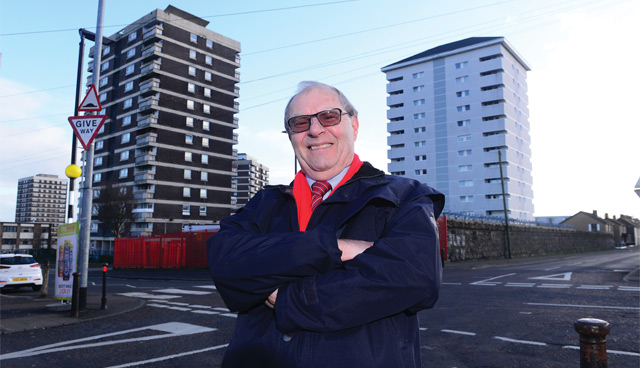Right homes, right place, right time

As the Housing Executive prepares to celebrate its 50th birthday next year, its Chair, Professor Peter Roberts outlines his ambition to see the organisation become the best comprehensive housing agency in Europe.
The Housing Executive’s creation was necessitated by a deeply divided society which had witnessed the largest forced movement of people in Europe since World War Two. Approaching 50 years on, the organisation’s Chair is adamant that it is as relevant and relied upon today as it was then in providing “good quality homes, excellent housing services, tailored support and sustainable neighbourhoods”.
As the largest publicly owned social landlord in western Europe, with a stock of over 85,000 properties and an annual revenue budget spend of £1.2 billion, the Housing Executive has an extensive reach and noticeable influence on households and communities, evidenced by its role in administering £600 million in housing benefits in the social and private sector, providing financial advice, tackling anti-social behaviour, promoting social enterprise and enabling neighbourhood development.
In delivering for almost 50 years, the Housing Executive has had to be adaptable to changing demands in what Roberts describes as a “very complex and fragmented market” in terms of personal circumstances and the volume of homeless presenters.
The body recognises acute demand for housing in specific areas of Northern Ireland where there are now significant waiting lists. At the same time, as the agency responsible for assisting the homeless in Northern Ireland, 20,000 people and families asked the Housing Executive for help dealing with homelessness last year.
Highlighting some of the causes of changing demand, Roberts prescribes changing attitudes to relationship separation, greater levels of societal social and physical mobility and an ageing and growing population as just some of the factors that have led the Housing Executive to seek to reform how social housing is delivered in Northern Ireland.
“It’s correct to say that we’re not perfect but I don’t think perfection can be achieved because of housing need changes, pattern of supply changes and demographic changes,” says Roberts.
“While we’re not perfect, we strive to improve what we do and we have a clear and focussed view of how we should deliver for our customers, not just our tenants but all the other customers that we serve through our various support programmes.”
Roberts describes the organisation as self-critical, but points to evidence from regular tenant omnibus surveys which show that the Housing Executive continues to match and outperform many other providers in terms of rent collection, tenant involvement and customer satisfaction.
“We’re hands-on,” he sates. “We don’t just issue contracts or provide grants for people to provide services. We’re very proactive in understanding the nature of demand and requirements within specific subject areas. For example, we are constantly looking at the consequences and causes of homelessness.”
A major output of the Housing Executive’s work in this regard is the Supporting People Programme, which has distributed over £1 billion to help deliver housing related support services since 2013.
Services are designed to enable vulnerable people to live as independently as possible in the community and range from supporting people with disabilities and older people to live in their own homes to accommodation for recovering drug and alcohol presenters and support for young people leaving care.
Active stock management
Again, highlighting the complexity of delivering support amidst changing demand, Roberts says that the Housing Executive are increasingly adopting and encouraging others to adopt an active stock management approach.
“It is about making sure we are providing people in communities with the right accommodation for them at a given stage of their life,” he adds.
Active stock management is a key theme running throughout four priority issues identified by Roberts as areas which need to be addressed if Northern Ireland is to find a solution to its current social housing challenges, namely:
- adaptation of existing properties through modularised additions;
- addressing rural area shortfall;
- the re-provisioning of homes at the end of their viable operational lives; and
- adding to the supply of new social homes.
I want to see us building again, because I think we can add to the efforts made by others to build social homes and we can increase supply of building beyond the existing delivery targets.
Focussing on the potential benefits of active stock management in relation to the Housing Executive’s elderly and vulnerable tenants, Roberts explains that the organisation is close to delivering a renewed Older People Strategy, which, along with partners, will seek to make best use of existing housing stock and develop specialised housing that is better suited to the requirements of older and vulnerable people.
“It is important that we address the key pressing questions of our time such as, how do we make provision and be proactive in relation to the existing, established and likely future needs of elderly and vulnerable people?” explains Roberts. “We need to be building the right homes, in the right place, at the right time.”
Outlining an example where the Housing Executive have identified benefits, Roberts says that traditional three or four bedroom accommodation is often not suitable to the needs of elderly or vulnerable tenants.
Roberts has championed an increase of specialist care facilities, where independence is blended with more readily available health and social care. He believes that the “extra care model” can aid service providers to be more responsive to needs and, ultimately, more effective and financially efficient.
“Doing this collectively as part of an overall community-based care approach through active stock management means that service providers can deliver multiple benefits with an added bonus that family homes can be liberated to meet general needs for housing,” he adds.
Adaptations
The Housing Executive has responsibility for adaptations to homes, but in a “challenging environment” for speedy delivery, often to the detriment of a tenant, Roberts has called for new thinking in this area.
Specific proposals to produce modular adaptation units which can be added and retracted more rapidly from properties than at present, are being assessed.
Barriers to this identified by Roberts are both financial and technological, in terms of the need to refine the methods of construction to facilitate off-site construction of modular pods. Explaining his reasoning behind such an approach, the Chair says: “It’s important to remember that a lot of the homes in our stock weren’t built to the standard of ‘lifetime homes’. Adaptation to make them viable for all stages of life is often very difficult.”
Roberts believes that a mindset change is now required from the traditional methods of house construction at the earliest stages of planning and building but emphasises that modular builds could help alleviate pressures on current stock.
Such an approach could also help address the ‘rural problem’ — broadly encompassing a relatively low proportion of social housing in rural areas, a more limited access to services, a growing population and greater levels of social deprivation.
“Modular presents an opportunity to enhance stock in areas where it is often quite expensive to do conventional builds. A modular approach also presents the opportunity to reduce energy consumption in rural areas through greater efficiencies, helping to address rural fuel poverty.”
The Chair has also called for a greater emphasis on the re-provisioning of homes that have reached the end of their operation or economic life. “It is not good value to the public purse in spending vast amounts of money to bring very old homes up to specification. In some cases we are finding ourselves having to patch up properties where, if we were operating to a strict value for money model, we would be demolishing.”
Housing Executive rents will rise in April, for the first time in five years, as it deals with the increasing cost of maintenance of homes on its budget, some of which are not fit for purpose. It has also suggested it may have to start “de-investing” in almost half of its portfolio if extra finances are not made available or viable reform is not initiated.
One solution put forward by Roberts to meet need for social homes is the granting of permission to the Housing Executive to build their own social homes. The organisation has not developed at any scale since its last housing completions, 20 years ago, when a government policy shift meant that housing associations became the main providers of new social housing.
“I want to see us building again, because I think we can add to the efforts made by others to build social homes and we can increase supply of building beyond the existing delivery targets. I see no reason at all, apart from an artificial rule set some time ago, which stopped us from borrowing,” says Roberts.
“We wouldn’t be borrowing because we wish to support revenue expenditure, we’d be borrowing to add to the capital asset base of the Housing Executive and the communities of Northern Ireland. We’re well placed to meet specific needs and requirements and I would like to see us supported to do that, not just through public funds but through the ability to borrow.”
Roberts emphasises that his vision for a comprehensive, full service Housing Executive would mean not only utilising the organisation’s own land for greater efficiency in delivering their own homes but also continuing to enable housing associations to deliver the homes that they want to build.
I would love to be in a position whereby we are tasked with a challenging output target. We need a focus on outputs, not obstacles.
Such is his conviction for the proposal to help alleviate the current housing challenges in Northern Ireland, he recently presented, to newly installed Communities Minister Deirdre Hargey, a proposal for the introduction of “Community Housing Zones”, which he describes as “a housing equivalent for free trade or enterprise zones”. Broadly speaking, such initiatives would bring together a range of housing delivery stakeholders and facilitate building through collaboration on all elements required for the design and delivery processes. This would facilitate the acquisition, consolidation and preparations of sites to enable the building of new social, and other, homes.
“We need to start thinking about solutions and not barriers,” he states. “I would love to be in a position whereby we are tasked with a challenging output target. We need a focus on outputs, not obstacles.”
Tower blocks
The Housing Executive has over 30 tower blocks, most of which are located in the Greater Belfast Region. These are a prime example of where the Housing Executive’s capacity to build could facilitate greater efficiencies through active stock management. The organisation’s Board holds the position that many of the blocks should be decommissioned over a period of time and that a comprehensive programme to re-provision homes, alongside a wider community-based regeneration plan for each neighbourhood, should be put in place.
The initial tower block strategy, which was initiated prior to the Grenfell fire, was put on hold while an Independent Reference Group was appointed to examine fire safety issues in its tower blocks. The organisation continues to work to stay “ahead of the curve” on matters of health and safety related to tower blocks.
“We were already aware that we needed to do work on the tower blocks and already aware that we were spending a disproportionate percentage of our maintenance and management budget on the tower blocks prior to Grenfell,” explains Roberts.
“Expert work was done by external surveyors which demonstrated that some of our tower blocks were getting close to the point of having a negative rather than a positive value. Some of those have now tipped.”
He explains that the Independent Reference Group’s first priority was to ensure that what happened at Grenfell, due to ineffective cladding, would not happen in Northern Ireland.
The second was to look at fire and safety measures and the third was to look at the long-term future proofing of those blocks seen to have a medium to long-term life. It also undertook the creation of recommendations for those tower blocks with a short-term life.
“I am aware that the tower blocks will always present a challenge because the requirements will change over time and we are trying to anticipate those requirements. The interim report from the Grenfell inquiry outlined recommendations, some of which we were already putting in place, but we continue to monitor the situation and will do our utmost to be ahead of the curve in relation to tower block fire and safety issues,” the Chair explains.
Of the four tower blocks belonging to the Housing Executive across Northern Ireland which were part of a pilot cladding scheme, all passed assessment post-Grenfell. However, further plans for cladding have been put on hold until the final recommendations of the inquiry are known.
“We have got to a position where we know comprehensively what we have got but we haven’t yet got a clear picture of what we might be required by statute to do. However, I emphasise that we are not willing to compromise on the safety of people’s lives living in our tower blocks,” he adds.
Vision
Looking to the future, the Chair coins the phrase “New half century, new approach”.
“We have a Housing Executive which is a model of good, honest endeavour and brokerage and has been for almost 50 years. We are still trusted by people to do a decent job and yes we have resource constraints and we have been inhibited in our ambition but we retain ambitions to be the best comprehensive housing agency in Europe.
“We want to provide exemplary homes which meet the needs of people in their communities as they change their requirements over their lifetime. At the same time I think we can be at the leading edge of combatting climate change in housing and delivering truly sustainable communities.
“I don’t think we’re perfect but we’re pretty good. I think we could be better and utilise innovation, determination and support from our communities in order to drive us forward.”
Professor Peter Roberts was appointed to the Board of the Housing Executive in 2012 and is also Co-Chair of the NHS Confederation Sustainable Development Group, was an Honorary Professor at Queen’s University Belfast and a Visiting Professor at the University of Ulster. Peter has a vast array of housing and regeneration experience. His research and professional interests cover a range of topics, including strategic planning, regeneration, housing and community development. In recent years, he has served on a number of public bodies, including the Academy for Sustainable Communities (as Chair) and the Homes and Communities Agency (as a non-executive director).






